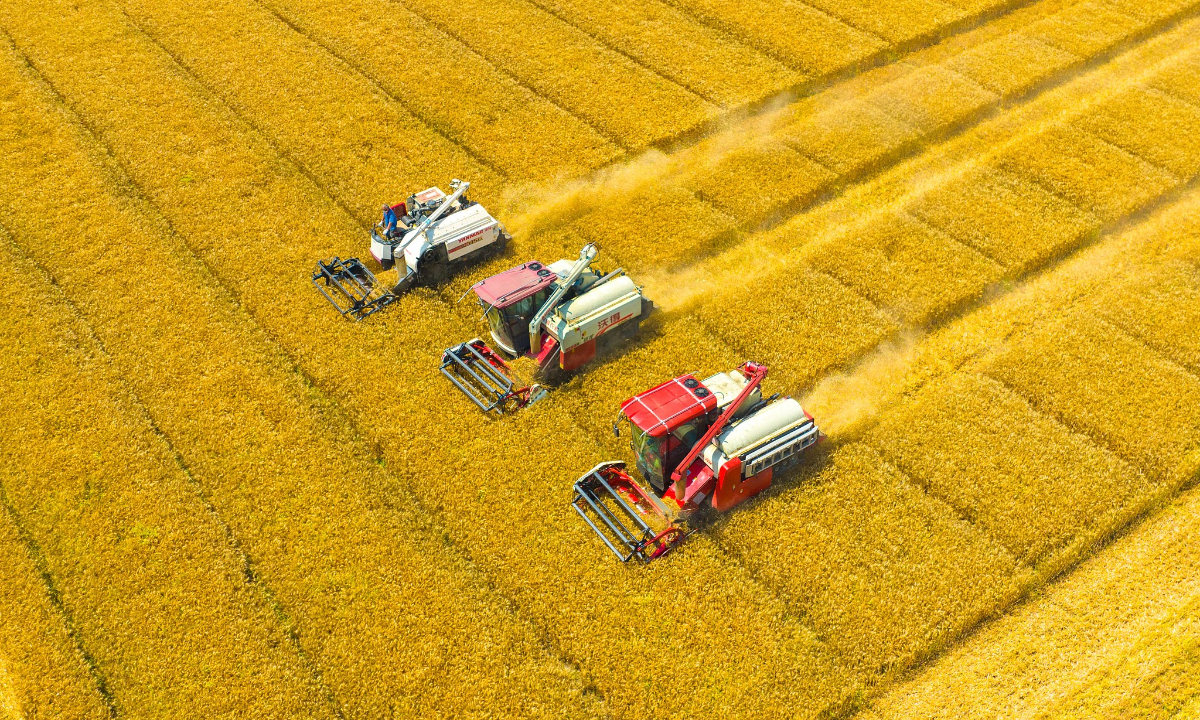
Grain harvest Photo: CFP
Russia's suspension of its participation in the Black Sea grain deal will cause a global price spike for the crop, as well as wheat, corn, sunflower oil and fertilizers, as both Ukraine and Russia are key suppliers. But the impact will be less than in 2022 when the Russia-Ukraine conflict broke out, due to changes in the world market, Chinese observers said.
The latest price rises will only have a limited impact on China, and they won't threaten the country's food security, as Ukraine is not a major grain supplier to China, which can import food by rail from Western Asia.
Russia announced on Monday that the deal had "essentially stopped," the Financial Times reported. The Black Sea grain deal, which was brokered by the UN and Turkey in June 2022, allows Ukraine to export grain via the Black Sea. The agreement was renewed three times and was set to expire at 5 pm ET Monday.
About 33 million metric tons of food have been exported by sea from Ukraine since August, the report said.
According to CNN, wheat futures on the Chicago Board of Trade jumped nearly 3 percent on Tuesday, and corn futures rose nearly 1 percent.
The suspension of the deal would directly affect Ukraine's 30 million tons of annual grain exports, because the country has no other similar ports and its land transport capacity is limited, Zhang Hong, a research fellow at the Chinese Academy of Social Sciences, told the Global Times on Tuesday.
Russia and Ukraine provide about 30 percent of global wheat supplies, 10 percent of corn and about 80 to 90 percent of sunflower oil, analysts said.
Zhang said that Ukraine alone exports about 12 percent of global wheat. Before the conflict, Ukraine was the fifth-largest wheat exporter globally.
"Amid persisting global inflation, the suspension will stretch global agricultural supplies and fuel a price rally," Jiao Shanwei, editor-in-chief of industry news website cngrain.com, told the Global Times on Tuesday. He noted that Ukraine mainly exports to the Middle East, North Africa and certain EU countries, which could be most affected.
But agricultural trade routes have shifted in the past year, with the traditional buyers of Ukraine grain turning to suppliers in the US and Canada, and some countries have built up stockpiles. "So the impact won't be so drastic this time," Jiao said.
In June, global food prices were down 23 percent from the all-time high in March 2022, according to the UN Food and Agriculture Organization.
Speaking of food security, China has abundant grain reserves and stable supplies, so the suspension of the Black Sea grain deal won't have much impact, said Zhang.
Photo: VCG


